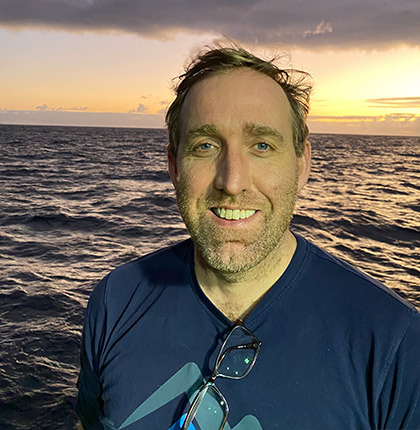2025-2028: Characterising the presence of dark oxygen production at polymetallic nodule habitats. £2,042,266, Nippon Foundation, PI: A.K. Sweetman
2025-2029: Assessing the environmental impacts of deep-sea mining of polymetallic nodules and seafloor massive sulphides. $10,000,000 (to SAMS: £110,000), JPI-Oceans/ DEFRA, PI: A.K. Sweetman.
2024-2027: DemoSponge: Assessing the ecology and biodiversity of deep-sea sponge grounds in the bathyal NE Atlantic. £500,000, BP, PI: A.K. Sweetman.
2023-2024: Estimating the biodiversity and community structure of benthic and demersal scavengers at inactive and active hydrothermal vents on the central and SE Indian Ocean Ridge. £55,000, Bundesanstalt für Geowissenschaften und Rohstoffe (BGR), PI: A.K. Sweetman.
2020-2024: SMARTEX – Seabed Mining And Resilience To EXperimental impact. £208,000, UKRI. PI and Work Package leader: A.K. Sweetman.
2020-2023 THE METALS COMPANY – Exploring baseline ecosystem function in the Clarion-Clipperton Zone of the Pacific Ocean. £2,195,000. PI: A.K. Sweetman.
2019-2023 iAtlantic: Integrated Assessment of Atlantic Marine Ecosystems in Space and Time. £376,000, EC H2020 programme. PI and Work Package leader: A.K. Sweetman
2019-2019: Devising solutions to aid coastal ecosystem sustainability – a case study on aquaculture impacts on mangrove systems in Vietnam. £30,000, Heriot-Watt GCRF internal fund. PI: H.L. Burdett
2018-2019: NEXUSS CTD equipment grant. £35,000, EPSRC. PI: A.K. Sweetman
2019-2024: One Ocean GCRF hub. £694,000. UKRI. PI: A.K. Sweetman
2017-2018: Characterisation of biodiversity and quantification of the relative abundances of scavengers at the seafloor in the BGR polymetallic nodule area in the N. Pacific. £52,000. Bundesanstalt für Geowissenschaften und Rohstoffe (BGR), Germany. PI: A.K. Sweetman
2017-2021: DEEPCCZ: Ecosystem-wide survey of biodiversity, connectivity and ecosystem function across the deep seafloor biome of the CCZ to help assess and manage the impacts of polymetallic nodule mining.£168,000, Gordon and Betty Moore Foundation. PI and Work Package leader: A.K. Sweetman
2016-2020: MERCES: Marine Ecosystem Restoration in Changing European Seas. £254,000. EC H2020 programme. PI and Work Package leader: A.K. Sweetman
2024
SWEETMAN AK, SMITH AJ, DE JONGE DSW et al. Evidence of dark oxygen production at the abyssal seafloor. Nat. Geosci. (2024). https://doi.org/10.1038/s41561-024-01480-8
HARTL M, BAUMAN L, SWEETMAN AK. “At-sea application of the Comet assay to a deep-sea fish.” Deep-Sea Research I. 208: 104298, 2024.
DE JONGE D, SMITH AJ, SWEETMAN AK. “Changes to upper-ocean ecosystems may directly impact abyssal scavenger communities.” Limnology and Oceanography. 69(8), 1695-1706, 2024.
DE JONGE DSW, GAURISAS DY, SMITH AJ, HOLMES E, OREJAS C, MOSQUERA GIMÉNEZ A, ROBERTS JM, BERNARDINO AF, SWEETMAN AK. “In situ benthic community response to a phytodetritus pulse in the Cabo Verde Abyssal Basin (tropical NE Atlantic) ” Progress in Oceanography. 229, 103340, 2024.
CECCHETTO MM, NUNNALLY C, SMITH CR, SWEETMAN AK.“High benthic community respiration and ecosystem response to phytodetrital input in a sub-polar fjord on the West Antarctic Peninsula.” Limnology and Oceanography. 69(11), 2610-2623, 2024.
GAURISAS DY, DE JONGE DSW, ALVES FMM, SMITH AJ, SWEETMAN AK, BERNARDINO AF. “Effects of increased temperature and altered POC composition on a bathyal macrofaunal community in Cabo Verde, NE Atlantic ” Progress in Oceanography. 229, 103352, 2024.
2023
ROBERTS JM, BIASTOCH A, CARREIRO-SILVA M, DEVEY C, DOHNA T, DORSCHEL B, GUNN V, HUVENNE VAI, JOHNSON D, JOLLIVET D, KENCHINGTON E, LARKIN K, MATABOS M, MORATO T, NAUMANN MS, OREJAS C, PEREZ JAA, RAGNARSSON SA, SMIT AJ, SWEETMAN AK, UNGER S, HENRY L-A. “A blueprint for integrating scientific approaches and international communities to assess basin-wide ocean ecosystem status” Nature Communications Earth & Environment, 4: 12, 2023.
2). HIDDINK JG, VAN DE VELDE SJ, MCCONNAUGHEY RA, DE BORGER E, O’NEILL FG, TIANO J, KAISER MJ, SWEETMAN AK, SCIBERRAS M. “Quantifying the carbon benefits of ending bottom trawling.” Nature. In press
3). CECCHETTO, MM, MOSER, A, SMITH, CR, VAN OEVELEN, D, SWEETMAN AK. “Abyssal seafloor response to fresh phytodetrital input in three Areas of Particular Environmental Interest (APEIs) in the polymetallic nodule-rich Clarion-Clipperton Zone (CCZ).” Deep-Sea Research I, In press.
4). GORI A, OREJAS C, MIENIS F, FERRIER-PAGÈS C, BILAN M, FLÖTER S, REYNAUD S, SWEETMAN AK, ROBERTS JM, WIENBERG C, HEBBELN D. “Natural hypoxic conditions do not affect the respiration rates of the cold-water coral Desmophyllum pertusum (Lophelia pertusa) living in the Angola margin (South-eastern Atlantic Ocean)” Deep-Sea Research I. In press.
PhD in Deep-Sea Ecology, Max Planck Institute for Marine Microbiology, Germany (2008)
M.Phil in Fisheries Ecology, University of Bergen, Norway (2003)
BSc (Hons) in Oceanography and Marine Biology, University of Southampton, UK (2002)
